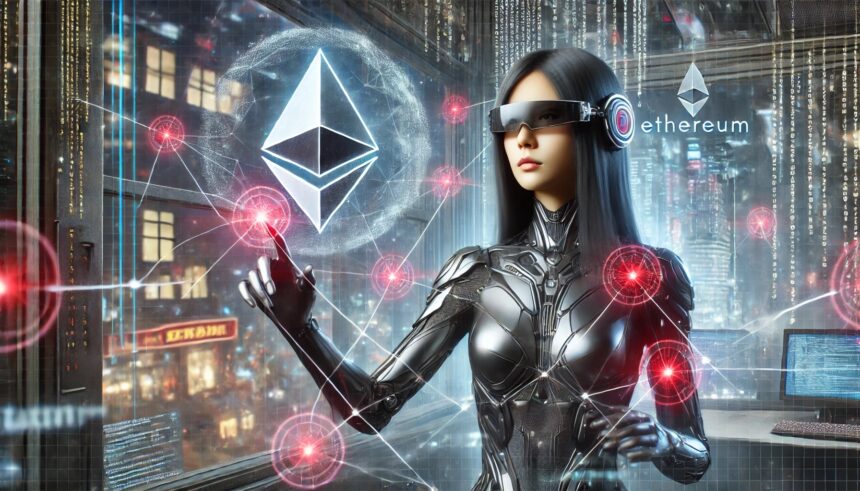AI Agents and the Future
Tech giants such as Google and Amazon are focused on predicting the future direction of society, and in recent months, both companies have begun making strategic moves to dominate the development of AI agents—automated assistants that navigate the internet to accomplish complex tasks on behalf of humans and other machines.
The effort to create a robust AI agent economy is still in its early stages. However, experts anticipate that when robots are eventually deployed widely to interact efficiently with the current economy and with one another, their productivity and output may match that of humans.
Building the AI Agent Economy
A key question surrounding the development of the AI agent economy is the infrastructure that will best support this growth. Increasingly, leading thinkers in Silicon Valley and the crypto space are converging on a singular answer to this lucrative question: Ethereum.
Recently, Ethereum’s core developers concluded that the network is exceptionally well-suited to serve as the foundational layer for the AI agent economy, due to its capability to provide three essential elements that the ecosystem currently lacks: payment infrastructure, identity verification, and trust.
The team is optimistic that within a few years, Ethereum will not only be foundational to the AI agent economy, but that AI agents will become the primary users of the network.
“For us, it’s very important. It’s a strategic area,” stated Davide Crapis, an Ethereum core developer focusing on AI, in an interview this week.
Crapis expressed that he believes within three to five years, machines will account for the majority of traffic on Ethereum.
Introducing ERC-8004
Earlier this month, Crapis introduced ERC-8004: a proposed interface for Ethereum designed to standardize how AI agents locate one another on the network and establish sufficient trust to engage in economic transactions.
The proposal addresses what Crapis identifies as significant flaws within existing frameworks for agent-to-agent interactions. In April, Google revealed the Agent2Agent protocol, which it claimed would allow AI agents to work together seamlessly and “drive unprecedented levels of efficiency and innovation.”
However, the framework does have limitations. Firstly, it currently lacks the capability to enable payments—a crucial component for a truly autonomous robotic economy. Secondly, it fails to provide agents with the means to identify and trust one another across the open internet. This means that, in practice, the protocol is effective only for enabling interactions among agents within a single organization, and for tasks that do not involve financial transactions.
Crapis noted that Ethereum is inherently capable of addressing these fundamental issues. The payment concern can be resolved with on-chain transactions, which AI agents are already able to execute. Regarding identity and trust, that’s where Ethereum excels—NFTs, for example, offer a secure way to establish a unique digital identity. ERC-8004 delivers a straightforward framework for AI agents to validate one another’s identities on-chain.
If Ethereum were to furnish that framework to support the AI agent economy, it would not be competing against the likes of Google. In fact, the tech giant is backing Crapis’ Ethereum proposal. Jordan Ellis, a core Google employee involved with the Agent2Agent protocol, co-authored ERC-8004.
“This, for me, is a signal that it’s not too early,” Crapis remarked regarding the collaboration. “In the sense that even in the traditional AI space, people are looking into agent-to-agent payments, and agent-to-agent identity.”
Standardization in the AI Agent Economy
Key stakeholders in the emerging AI agent economy want the ecosystem to be universally standardized to enhance its potential reach and usability. While these companies may not be crypto advocates per se, if blockchain networks offer solutions to their challenges more efficiently than other methods, what is the downside?
Throughout the past decade, crypto projects have often struggled to achieve mass adoption, largely due to their inability to convince mainstream consumers that the effort required to navigate complex blockchain networks justifies the financial incentives or privacy benefits.
Yet, in the impending age of the robotic economy, crypto’s marketing challenges may become less of a drawback. Crapis, who has returned to the Ethereum Foundation after spending years working on AI-related initiatives, firmly believes that when the AI agent economy flourishes, robots will rationally select the most effective environment for transactions—and that optimal market will undoubtedly be Ethereum.
“Our challenge has been making [Ethereum] more UX-friendly for humans to use, trying to shift their behavior,” Crapis explained. “But if the user is an agent or a machine, then it’s fairly easy. Robots don’t have any problems remembering their private keys.”
The Evolution of Ethereum
The traditional economy was designed for humans and focused on verifying human actions. (What’s your mother’s maiden name?) In contrast, Ethereum appears to have been built for robots, long before they had the capability to operate independently on the internet. What was once seen as a drawback—the network’s complicated user experience—may now prove to be an advantage in the era of the agent-dominated internet.
Even among other blockchain platforms, the Ethereum team believes that their network’s distinctive multi-layer structure is uniquely equipped to accommodate the significant volume of AI agent traffic expected in the coming years.
According to them, the base Ethereum blockchain will offer foundational security and stability to manage the influx and verify high-stakes transactions, while a customizable, expandable, affordable, and rapid array of layer-2 networks will manage the anticipated large number of everyday, smaller transactions.
Other blockchains are likely to struggle under the weight of the entire AI agent economy, Crapis asserted.
“Solana, in its current design, cannot sustain the machine economy,” he stated, using Ethereum’s competitor network as an example. “They have no idea how much activity can come on-chain, once these machines start using it.”
Once the AI agent economy fully emerges, Crapis predicts it will redefine Ethereum’s role in the same way decentralized finance (DeFi) did back in 2020.
Looking Ahead
Getting the Ethereum developer ecosystem to agree on a standard for agent-to-agent interactions is a vital initial step in preparing for that future. Crapis mentioned his plans to refine ERC-8004 in the upcoming months, as he gathers feedback from community members.
However, the standard will be finalized promptly to get ready for the impending arrival of a legion of intelligent, crypto-empowered robots.
“I cannot predict when this takeoff will happen,” Crapis acknowledged, “but I feel that we have some urgency to build for it.”




















